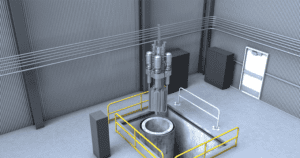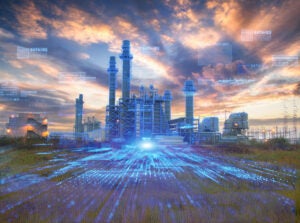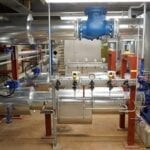NOV. 2, 2022 — Air source heat pumps (ASHPs) have emerged as a low-carbon way of heating that can potentially overcome some of the concerns associated with extreme temperatures, changing climate, and environmental adversities. When properly installed, these heat pumps can deliver up to three times more heat energy than the electricity consumed.
The need to reduce the dependence on fossil fuels for residential heating has encouraged multiple governments to persuade consumers to install ASHPs. For instance, in October 2022, France launched a new national energy savings plan to avoid winter power cuts. According to the Minister for Energy Transition, the French government has earmarked approximately $787 million to reduce energy consumption and offer up to $8,816 per household in subsidies to replace gas boilers with energy-efficient heat pumps.
According to the recent research report by Global Market Insights Inc, the air source heat pump market is projected to go beyond USD 85 billion by 2030.
Mentioned below are the latest developments taking place in the air source heat pump market:
- Panasonic to invest 145 million euros in air-to-water heat pump factory in Czech by 2026
Air-to-water heat pumps capture and use heat present in the air and therefore emit less carbon dioxide as compared to conventional combustion heaters that rely on fossil fuels. Rising environmental awareness and increasing volatility associated with the energy supply is expected to propel the demand for eco-friendly heating systems like ASHPs.
In September 2022, Panasonic Corporation announced an investment worth 145 million euros in its Czech plant by FY ending in March 2026 in line with a steady shift from fossil fuel-based energy sources to sustainable energy systems. The investment will accelerate the production of air-to-water heat pumps.
- Trane unveils new heat pump with electric heating & cooling
Amidst rapid electrification of industries and industrial processes, Trane Technologies owned Trane unveiled the Ascent® Air-to-Water Heat Pump Model ACX, a first-of-its-kind A2W solution in its portfolio that provides electric heating as well as cooling. It will allow building owners to achieve decarbonization through electric solutions.
The new ACX model is designed with heat pump technology as well as a chiller which enables the heating and cooling of space using electricity. In addition to this, it transfers heat with the help of a compressor. As a result, this technique makes heat pumps nearly three times more efficient than other electric heating solutions.
- Worcester Bosch launches Hybrid 7000iAW & 7001iAW A2W heat pump for homeowners
In November 2021, Worcester Bosch, a subsidiary of Robert Bosch launched a low-carbon A2W heat pump called the 7001iAW and a hybrid heat pump and boiler, Hybrid 7000iAW. The former A2W heat pump enables heating and cooling for homeowners, whereas the hybrid product ensures compatibility with a wide variety of combi boilers and heat pumps.
The newly launched products are ideal to be fitted in buildings and renovation projects. Its low-carbon technology is designed to offer high efficiency along with all the benefits associated with the use of ambient air as the primary energy source for space heating/cooling.
- Daikin Europe to double the production capacity of air-to-water heat pumps
Increasing energy demand and favorable government policies will accelerate the adoption of air-source heat pumps in Europe. In April 2022, Daikin Europe debuted its new state-of-the-art production line for top-grade A2W heat pumps. The new factory underpins the company’s commitment to double the production of A2W heat pumps in its factory in Ostend, Belgium.
The investment is a pivotal step in Daikin’s five-year strategic roadmap to address the growing demand for sustainable heating solutions in Europe. It also expects the demand for ASHPs to increase rapidly over the coming decade owing to the ambitious 2050 climate neutrality goals set by the European Union.









